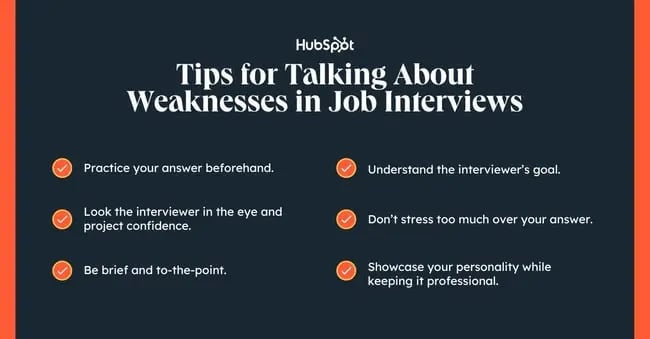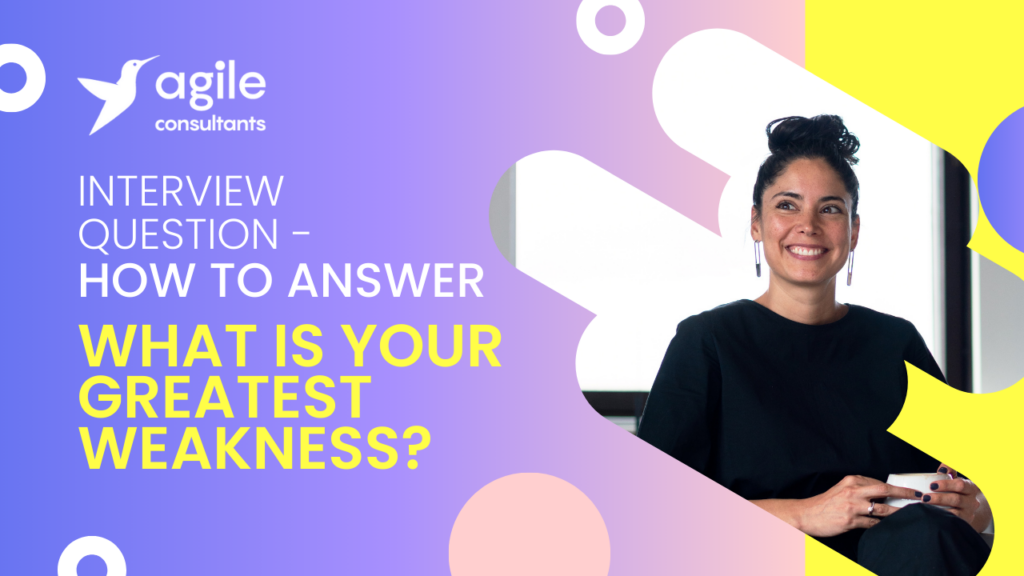Are you preparing for an interview and feeling nervous about answering the dreaded “greatest weakness” question? You’re not alone. It’s a tricky question that often leaves candidates feeling stumped. But with the right approach, you can turn this question into a powerful opportunity to showcase your self-awareness and growth mindset.

Credit: blog.hubspot.com
Understanding the Purpose of the Question
The “greatest weakness” question is not designed to trip you up or expose your flaws. Instead, it’s an opportunity for you to demonstrate your ability to reflect on your own development and improvement. Employers want to see that you can identify areas for growth and take proactive steps to address them.
Approaching the question with a positive and confident mindset is key. Instead of viewing it as a potential pitfall, consider it as a chance to highlight your self-awareness and commitment to personal and professional development.

Credit: blog.hubspot.com
Choosing the Right Weakness
When selecting a weakness to discuss, it’s essential to strike the right balance. You want to be honest without casting doubt on your ability to perform in the role. Avoid mentioning weaknesses that are directly related to essential job functions. Instead, focus on areas where you have made progress or are actively working to improve.
Consider discussing a skill or trait that is not central to the role but is still relevant in a broader sense. For example, if you’re interviewing for a marketing position, you might talk about how you’ve been working to improve your public speaking skills, which, while not a core requirement, can still be valuable in a marketing role.
Presenting Your Weakness in a Positive Light
Once you’ve identified a suitable weakness to discuss, it’s crucial to frame it in a positive and proactive manner. Instead of simply stating the weakness, talk about the steps you’ve taken or plan to take to address it. This demonstrates your commitment to self-improvement and your willingness to take ownership of your development.
For example, if you’re discussing a tendency to get bogged down in details, you might explain how you’ve been implementing time management techniques or seeking feedback from colleagues to streamline your workflow. By highlighting your efforts to overcome the weakness, you’ll show the interviewer that you’re proactive and dedicated to growth.
Illustrating Growth and Development
An effective way to approach the “greatest weakness” question is to provide concrete examples of how you’ve worked to address the issue. Share a specific instance where you recognized the weakness, took action to improve, and ultimately achieved positive results.
Using the previous example of getting bogged down in details, you could share a story about a project where your attention to minutiae initially slowed progress, but through implementing new strategies, you were able to streamline the process and deliver exceptional results. This real-world example will underscore your ability to recognize and address weaknesses effectively.
Practicing Your Response
As with any interview question, preparation is key. Take the time to craft and rehearse your response to the “greatest weakness” question. Consider enlisting a friend or family member to conduct a mock interview and provide constructive feedback.
By practicing your response, you’ll gain confidence and familiarity with discussing your weakness in a positive and constructive manner. This preparation will help ensure that you present yourself in the best possible light during the interview.
Frequently Asked Questions On Greatest Weakness Interview Questions: Expert Tips
Q: What Are The Common Weakness Interview Questions?
A: Discover the most popular weakness interview questions and prepare effective answers to impress your interviewer.
Q: How Should I Answer The Greatest Weakness Question?
A: Craft a compelling response by focusing on self-awareness, growth, and demonstrating how you overcome your weaknesses.
Q: What Is The Purpose Of Asking Weakness Interview Questions?
A: Employers assess your self-awareness, willingness to improve, and how you handle challenges to evaluate your fit for the role.
Q: Are Weakness Interview Questions A Deal-breaker?
A: No, they provide an opportunity to showcase your growth mindset and your ability to recognize and address your weaknesses.
Conclusion
The “greatest weakness” interview question can seem daunting, but with the right approach, it’s an opportunity to showcase your self-awareness, commitment to growth, and ability to overcome challenges. By choosing the right weakness, framing it positively, and providing examples of your development, you can turn this potentially tricky question into a chance to impress the interviewer with your maturity and professionalism.
Remember, the goal is not to present yourself as perfect but to demonstrate that you possess the insight and drive to continually improve and excel in your career.

